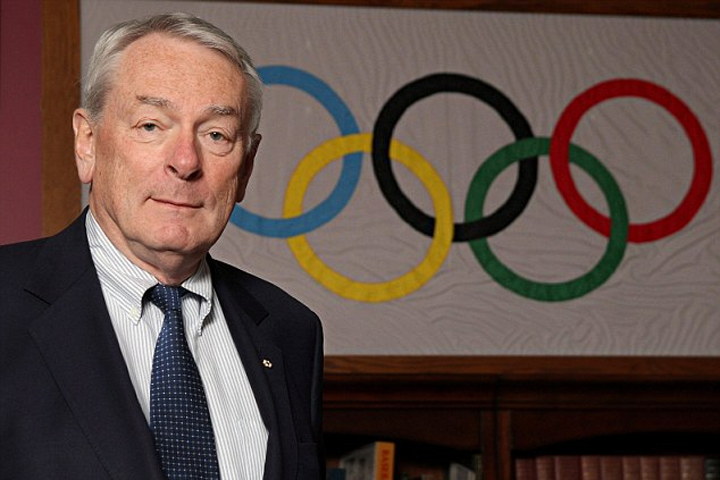
Richard Pound has warned that International Olympic Committee (IOC) members must retain a genuine influence in the process to reform bidding systems for the Olympic Games.
An IOC Executive Board meeting here tomorrow is expected to formally approve plans to jointly award the 2024 and 2028 Olympic and Paralympic Games together later this year.
A decision will follow a presentation from the four IOC vice-presidents who have co-chaired a Working Group investigating changes to the bidding process.
IOC members will then have an opportunity to discuss the topic at a Candidate City Briefing, due to take place here on July 11 and 12.
Pound, the longest serving current member of the IOC having joined it in 1978, claimed that a change to the Olympic Charter is required if any joint awarding it to go ahead.
“I am looking forward to hearing how those four IOC vice-presidents charged with the leading the Working Group come up with something that Thomas Bach will approve,” the Canadian told insidethegames.
“I think an Olympic Charter change will certainly be required.
“Clearly, if the decision is made, it will remove one of the few remaining powers of the IOC members.
“I think some will be annoyed about this, I certainly am.
“The IOC Executive Board certainly has got to give some thought about member power.
“These ideas [on 2024 and 2028] have been on the table for well over a year now but we haven’t had a single opportunity to discuss them.
“We will do this in July and I expect that, in the corridors of that meeting, there will be lots of discussions about how the membership has been eviscerated from the process.”
Rule 33.2 of the Olympic Charter says, “Save in exceptional circumstances, such election [for Olympic host cities] takes place seven years before the celebration of the Olympic Games.”
IOC President Thomas Bach, like Pound a qualified lawyer, has claimed that this means they would be able to go ahead with the joint awarding without any such revision.
He has stopped short of admitting that the current situation is “exceptional.”
There have been two bidders for the Olympics in the past.
For the 1980 Games only Moscow and Los Angeles bid and the event was awarded to the Soviet capital.
Then for the 1988 Olympics the bid was a contest between Seoul and Nagoya, the South Korean capital comfortably beating its Japanese rival.
There were also only two bidders for the 2022 Winter Olympics and Paralympics, which were awarded to Beijing after they narrowly defeated Almaty by four votes.
Bach has promised that a “vote” will be held at the IOC Session in Lima on September 13.
It is unclear at this stage what IOC members will be voting on.
One scenario is that the IOC membership will have one ballot paper with an opportunity to vote for their preferred host of both the 2024 and 2028 Olympic Games separately.
It is more likely, however, that a preferred order will be proposed beforehand, either by the IOC Executive Board or by the cities themselves.
The IOC members could then just vote to rubber-stamp this one proposal.
Paris seem more likely to host in 2024 and sole rival Los Angeles would be the location for the later edition.
Pound served two terms as IOC vice-president between 1987 and 1991 and 1996 and 2000 and held Executive Board positions between 1983 and 1987 and 1992 and 1996.
He unsuccessfully attempted to return to the ruling Board at both the 2013 and 2014 IOC Sessions and has since served in a backbench position.
The 75-year-old said that, “ordinarily speaking”, he would disagree with a joint awarding but supports the idea in current circumstances.
“I think that we have two very good candidates, and it would be nice to have them in the bank,” he told insidethegames.
“It might get us through this troubled time when everybody thinks that hosting an Olympic Games costs as much as it did in Sochi [2014].
“This is simply not true, but it is an easy message to communicate to the populace.
“We have got to find some way to assess candidates differently.
“In the Western democracies, you have 25 percent of people who are against everything all of the time; so even if you gain two to one support among the remaining 75 percent, then that is only half of all people…
“We are not doing it right and getting candidates to focus on how to do the job properly.”
One idea which may be discussed tomorrow in relation to the 2026 Winter Olympics and beyond concerns moving away from an official bidding process in favor of a less formal consultation.
Pound described this as an “interesting proposal.”
“The system of sitting in Lausanne and waiting for bids to come in is certainly not working,” he said.
“At present, we have enthusiastic community figures who press ahead with bids but without doing the required economic and community studies.
“And then opposition will rise and, with it, the dreaded referendum.
“Then it is the IOC, rather than the cities themselves, who get the negative coverage.
“I think the IOC needs to be more rigorous during the evaluation process.
“They need to say to cities: ‘What is the required political process, what are the steps, who is going to pay?’
“Then we must eliminate unprepared candidates before the bidding process officially begins.”
By Nick Butler
Republished with permission from insidethegames.biz.